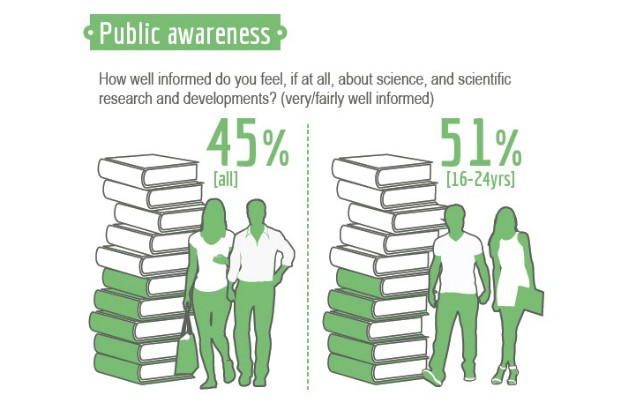
The Public Attitudes to Science series of studies is the only evidence of public attitudes and understanding of science in its broadest form across the UK.
The research from these surveys, which has been published regularly since 2000, informs BIS’s Science and Society activities and policies and is also used by our stakeholders, such as the British Science Association, EngineeringUK and the Royal Society.
Public Attitudes to Science 2014 is the 5th in the series, and comprises a mix of quantitative research (face to face survey of more than 1,700 people across the UK and qualitative research). For the 2014 study, we were keen to ensure that this mixed method approach also included social listening for the first time, in order to understand if, how and where the public were discussing science and technology online.
What we did
Ipsos MORI were appointed by competitive tender to conduct the overall study. This included social listening: a 12 month research exercise into how people talk about key science stories. We tracked online conversations about science stories which were particularly topical in the media at the time (eg Bovine TB in badgers, shale gas, climate change, GM food, and animal research). The Brandwatch social media platform was used to measure internet traffic volumes across a range of online sources, including Twitter, forums, blogs and news. Some of the data was then analysed qualitatively, looking at who was talking and what they were saying, as well as searching for themes, patterns and linkages.
This wasn’t the only digital activity that we had during the study. The British Science Association hosted a blog for us on their website which we used to publicise the research. This helped us to reach our audience more effectively, ie ‘go where the audience already is’. We invited different members of the scientific community to contribute and the blog entry by Suzi Gage (2012 UK science blog prize winner) was the most popular (2,200+ unique page views).
We also publicised the research on Twitter both corporately and personally. We were pleased to take part in the regular #scicommlit (science communication literature) Twitter chat / book club organised by Graphic Science. They actually organised 2 themed chats (one held at lunchtime, the other in the evening) to discuss the research but despite publicising these beforehand we found that there was limited discussion and involvement from other interested parties.
How people discuss science online depends on various factors
The findings gave us more insight into how science is discussed online, and enabled us to develop a toolkit for science communicators who want to engage online.
Key findings
The Audience: Discussion of science issues online is often among the pre-engaged who already hold strong views. Even the most animated Twitter debate is unlikely to reach many people who are not already interested and informed, though topics which have a humorous slant, visual appeal, or a public health element are more likely to reach a wider audience.
The Conversations: Wide online conversation around science-related issues is not always a marker for scientific discussion of the issue. Where participants in online conversations cite scientific evidence, science is usually used to shore up ethical or political arguments, rather than to inform, or present a balanced picture of all the research on an issue.
Trusted sources: Many of the debates boiled down to discussions of scientific authority and what this actually means and who possesses it. No consensus on authoritative sources, but general view that politicians especially lack credibility in science debate unless they have the backing of respected organisations.
Implications – social media tips and tricks for science communicators
Remember that trust is often low. In scientific debates, it tends to be attached to institutions and posts rather than people. Trust is likely to be highest in those organisations seen as independent and scientists aligned with them - use this form of authority where possible to spread your message.
Traditional media is your friend! Much of the online conversation consists of links back to trusted sources; the BBC and the traditional newspapers in particular for science conversations, but also the more accessible specialist media like Scientific American. Stories, research findings and opinion pieces in these media will be better trusted and have more reach.
Science alone isn’t enough. You need to grab people’s attention and make your story ‘shareable’. What can you do to make what you’re saying more visually interesting, more humorous or more relevant to people’s daily lives?
Don’t just preach to the converted! Many interventions into the online science conversation are unlikely to reach those who are uninterested or on the ‘other side’ of the debate unless you actively and directly engage them. Read further details.
Impacts on the policy team
Informs our understanding of communicating science stories online. We were the first team in BIS to commission this type of research and shared our experience through a departmental Digital Fortnight event with Ipsos Mori.
We used Twitter to engage with our influencers to help us achieve a wider audience at launch, increasing our own confidence in this area.
To build on this research, we recently worked with DECC on evaluating the cross government #BackClimateAction tweetathon. Over 16,000 people or organisations were involved through either tweets, blogs or comments and we found that the nature of the discussion was overwhelmingly positive.
Stay up-to-date by signing up for email alerts from this blog.
Leave a comment